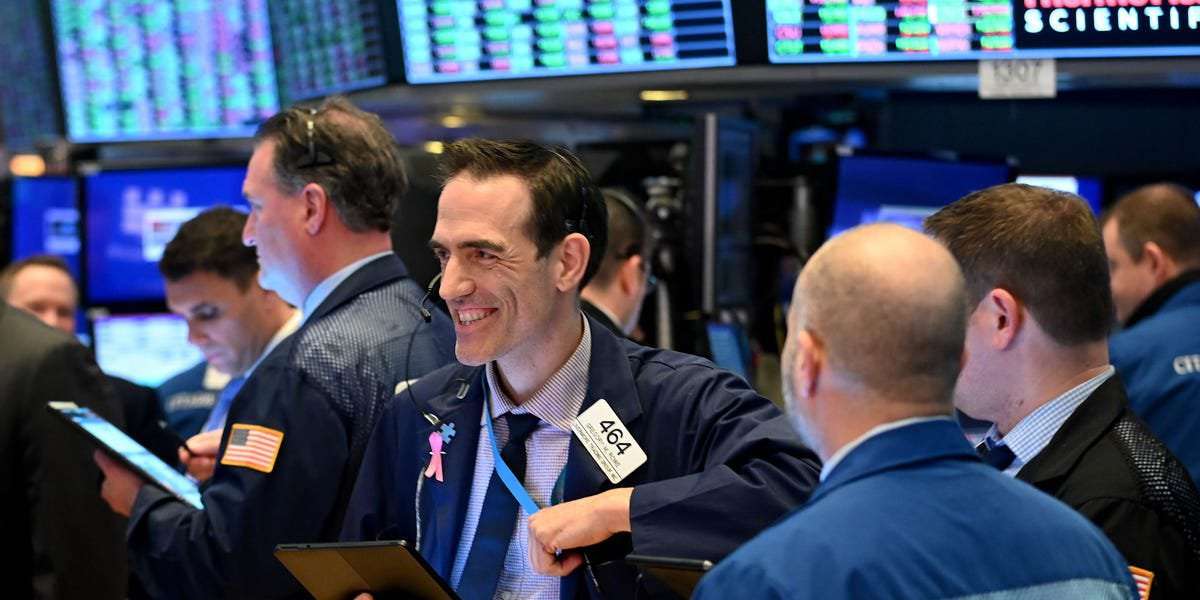Wall Street bonuses have increased by 1,217% since 1985, according to New York comptroller data.
If the federal minimum wage had grown at that same rate, it would be $44 an hour.
That pay gap is also making the racial and gender pay gap worse because white men dominate finance.
See more stories on Insider's business page.
The chaos that the coronavirus pandemic unleashed on America's economy turned out to be a major boon for Wall Street traders, according to new data from the New York state comptroller's office.
Wall Street firms paid their New York City-based traders an average bonus of $184,000 last year, a 10% increase from 2019, New York's comptroller, Thomas DiNapoli, said in a press release Friday.
But those paydays have been skyrocketing for decades. Since 1985, Wall Street traders' bonuses have grown 1,217% — and that's just part of their overall pay, which was more than $406,000 on average in 2019, according to data from DiNapoli's office.
By comparison, the federal minimum wage has flatlined at $7.25 an hour — or $15,080 annually — for 12 consecutive years. When adjusted for inflation, it has actually decreased by 11% since 1985.
If the minimum wage had instead grown at the same rate as Wall Street bonuses, it would be $44.12 an hour today.
Unlike a majority of the US, Wall Street saw massive financial success in 2020, and experts say it exposed just how detached the industry has become from the rest of the country's reality.
"It's just another reminder that there's a total disconnect between what happens on Wall Street and what happens in people's everyday lives and in the real economy," Sarah Anderson, the director of the global economy program at the Institute for Policy Studies, a left-leaning think tank, told Insider.
Read more: Reddit day traders wanted to beat Wall Street to prove the system is rigged. Instead, they did it by losing.
The stock market blew past pre-pandemic levels months ago as millions of Americans still struggled to find work, while increased volatility in the markets led to record years for Wall Street firms that netted bank executives paydays of up to $33 million, even as many banks laid off workers despite promises not to during the pandemic.
In a blog post for IPS on Monday, Anderson highlighted how deregulation of the financial industry had allowed firms to link traders' pay packages to increasingly risky investing practices that are beneficial mostly for Wall Street.
"So much of what is the most rewarded on Wall Street is the kind of trading activity that really doesn't add a lot to the real economy and isn't essential," Anderson told Insider, adding that last year's huge bonuses were "mostly because of market volatility, not necessarily because they've added a lot of value to the economy."
After the 2008 financial crisis, lawmakers passed the Dodd-Frank Act, which banned pay packages with "inappropriate risks," but Wall Street lobbyists have successfully blocked efforts to implement the rule for years.
IPS' report also examined how Wall Street had made racial and gender pay disparities worse by disproportionately hiring white male employees for decades with people of color and women overrepresented in low-wage jobs.
"Nationally, securities industry employees are 80.5 percent white, 5.8 percent Black, 11.5 percent Asian, and 8.1 percent Latino. By contrast, whites make up an estimated 55.4 percent of people in jobs that pay less than $15 per hour," Anderson wrote.
Wall Street's risky, lucrative business models and pay practices are coming under increased scrutiny as the pandemic forces Americans to reckon with the country's growing inequality.
"I just hope that it will lead to a real assessment of how skewed our values are when people doing these essential jobs are paid such a pittance compared to people on Wall Street," Anderson told Insider.

Sb109 on April 10th, 2021 at 16:11 UTC »
Now how much would it be if tied to cost of college?
Unlucky-Prize on April 10th, 2021 at 16:10 UTC »
Imagine what it would be if it grew at the same rate as college tuition (or to an extent, college administration leadership salaries).
wwarnout on April 10th, 2021 at 14:59 UTC »
Starting with the current minimum wage of $7.25, $44 is about 6 times higher.
I find it very hard to believe that Wall Street bonuses have ONLY increased by a factor of 6.
It's time to increase taxes on the wealthy. Here's a compelling argument (chart showing all taxes on wealthy vs everyone else since 1950):
https://video.twimg.com/tweet_video/EX62u9bXsAUtRO8.mp4